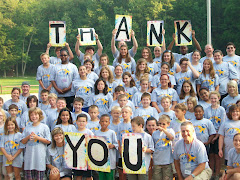Where children learn to grieve and heal.
Thanks for stopping by the Camp Erin Blog! You will not only find the most up to date info happening with Camp Erins across the country, but also some great resources and applicable information for grieving families.
Camp Erin is the largest bereavement camp in the country - designed for youth ages 6-17 who are grieving the loss of someone close to them. It is a weekend-long experience filled with traditional, fun, camp activities combined with grief education and emotional support — facilitated by grief professionals and trained volunteers from local hospice and grief counseling agencies. Camp Erin is the largest network of bereavement camps in the United States with 36 camps in 23 states. More than 2,500 greiving children and teens will receive the healing experience of Camp Erin this year!
September 27, 2010
Back to School - Helpful Tips for the Grieving Student
1.) Allow a grieving student to express how they feel in his or her own words.
2.) Be patient and give them time to adjust to their new schedule and schoolwork.
3.) Be honest with the grieving student. Knowing the truth helps them to understand and heal.
4.) Encourage the student to ask questions about the loss. Helping them to understand death will allow them to make correct interpretations.
5.) Grieving is hard work and every person expresses grief differently. Support your student regardless of how they may express their grief.
6.) Encourage your student to be open about what he or she needs from you. Let them know that they can always reach out to you for support.
7.) Connect them to resources outside the classroom. This could be a school psychologist or librarian. Allowing a student to leave the classroom when necessary will help when he or she needs personal space.
8.) Make sure to take time for you to grieve. The loss of someone close to your student may be affecting you as well. The more you let yourself heal, the better you will be at understanding your student’s grief.
Knowing how to help a grieving student can make the transition back to school easier and more comfortable for everyone. For more on these tips, visit Help Your Student Deal with Grief and Loss.
September 10, 2010
Healing through Creativity
Every year the Alliance for Young Artists & Writers is fortunate to witness the incredible talent of creative teens from across the country who submit their work to the Scholastic Art & Writing Awards. The words we read and the artwork we view tell a multitude of stories about the experiences of teenagers from all walks of life. On September 15 we will once again open registration for students in grades 7 through 12 to submit their work in 30 categories of art and writing. We know that we’ll see a breadth of imagination and a depth of emotion. And now, thanks to a sponsorship by the New York Life Foundation, we will also be able to encourage students who are dealing with issues of loss and bereavement by offering six very special scholarships to select award winners.




